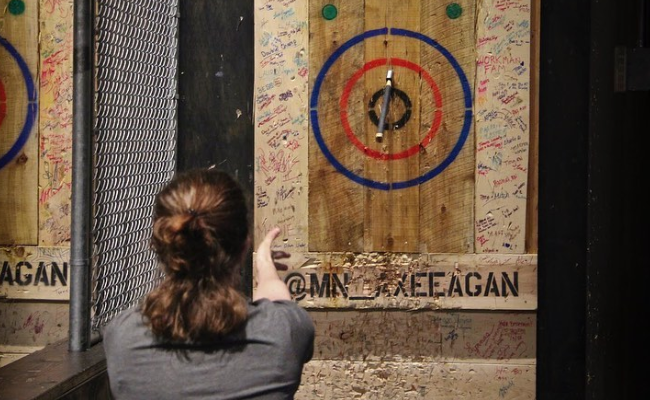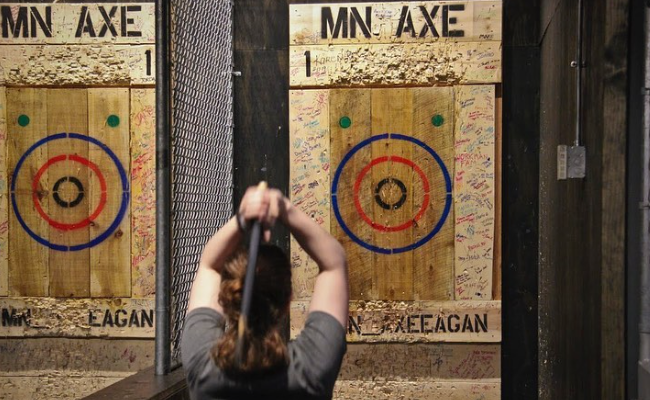Axe Throwing for Beginners: How to Play, Strategy, and Little Known Terms Everyone Should Know
6 min read
Are you ready to embark on an exhilarating journey into the world of axe throwing? Whether you’re a seasoned adventurer or simply seeking a unique way to unleash your inner lumberjack, this comprehensive guide is your key to success. With an enthusiast’s tone, active voice, and plenty of engaging content, we’re here to help you master the art of axe throwing.
What is Axe Throwing, and How Do You Play?
Are you intrigued by the thrill of axe throwing but not sure where to begin? What exactly is axe throwing, and how do you play? Let’s dive into the basics. For more axe throwing rules by the World Axe Throwing League here.
Axe throwing is a dynamic sport that involves hurling a small axe at a target to score points. It combines precision, strength, and technique, making it both challenging and incredibly satisfying.

Getting Started: Finding the Right Venue
Now that you’re eager to try your hand at axe throwing, where can you find the perfect venue? What should you consider when selecting the right spot for your adventure?
- Minnesota Axe Throwing: Minnesota is home to some fantastic axe throwing venues. Whether you’re in Minneapolis, St. Paul, or another part of the state, you’ll find a variety of places to practice your skills.
- Bad Axe Throwing: Bad Axe is a renowned chain of axe throwing locations across North America, known for its high-quality facilities and expert instructors.
- Local Axe Throwing Spots: Explore local options, as many cities now have dedicated axe throwing venues that offer a unique and entertaining experience.
Safety First: Rules and Equipment
Before you embark on your axe throwing adventure, it’s crucial to understand the rules and equipment that ensure a safe and enjoyable experience. What safety measures should you be aware of?
- Safety Guidelines: Always follow the safety guidelines provided by the venue. These rules are in place to protect both you and those around you.
- Closed-Toe Shoes: Wear closed-toe shoes to safeguard your feet from potential accidents. Flip-flops and sandals are a no-go in the axe throwing world.
- Safety Equipment: Some venues may require safety gear, such as helmets or safety glasses. Don’t worry; these are designed to enhance your safety.
- No Alcohol or Drugs: Most venues strictly prohibit the consumption of alcohol or drugs before or during axe throwing sessions to maintain a safe environment.

Axe Throwing Basics: How to Play
Now that you’ve chosen a venue and understand the importance of safety, how exactly do you play axe throwing? Let’s break it down step by step.
Step 1: Grip and Stance
To get started, you’ll need to master the axe grip and stance:
- Two-Handed Grip: This is the most common grip used in axe throwing. Place your dominant hand at the bottom of the handle, with your non-dominant hand just above it. Maintain slightly bent elbows for better control.
- Stance and Distance: Stand with your feet shoulder-width apart, about 12 to 15 feet from the target. Keep your body perpendicular to the target.
Step 2: Aiming and Throwing
With the right grip and stance, it’s time to aim and throw:
- Focus on Your Target: Concentrate on your target, whether it’s the bullseye or a designated scoring area.
- Step Forward: Take a step forward with your lead foot, shifting your weight slightly forward.
- Smooth Motion: Bring the axe behind your head while maintaining your gaze on the target. In one fluid motion, swing the axe forward, releasing it when your dominant hand reaches eye level.
- Follow Through: Ensure a proper follow-through by extending your arms toward the target after releasing the axe.
Step 3: Scoring
Axe throwing typically follows a point system. Different areas of the target offer various point values. Familiarize yourself with the scoring system to track your progress.

Axe Throwing Strategy: Hitting the Bullseye
Now that you’ve got the basics down, how can you improve your axe throwing accuracy and strategy? Let’s explore some tips:
- Practice Consistency: Consistency is key to becoming a proficient axe thrower. Focus on maintaining the same grip, stance, and release for each throw.
- Aim Small, Miss Small: Instead of aiming for the entire target, focus on a specific point within the target area. This refined approach can enhance your accuracy.
- Distance Management: Experiment with your distance from the target to find the sweet spot for your throws. Some find that slight adjustments make a big difference.
- Stay Relaxed: Tension in your body can lead to erratic throws. Keep your body relaxed and execute a smooth, controlled motion.
- Learn from Mistakes: Don’t get discouraged by missed shots. Use them as opportunities to analyze what went wrong and refine your technique.
- Positive Mindset: Maintaining a positive mindset and staying focused on the target can significantly improve your performance.
Unveiling Little Known Terms
As with any sport, axe throwing has its own set of terms and jargon. To truly immerse yourself in the world of axe throwing, familiarize yourself with these lesser-known terms:
- Bullseye: The central and highest-scoring area on the target.
- Kill Shot: A high-stakes throw aimed at a challenging target for extra points.
- Two-Handed Grip: The most common grip used in axe throwing, with both hands on the axe handle.
- One-Handed Grip: An alternative grip style using only one hand on the axe handle.
- Lumberjack: A term often used to describe a skilled axe thrower.
- Stick: Successfully landing the axe in the target is referred to as “sticking” the throw.
- Follow-Through: The continuation of the throwing motion after releasing the axe.
- Line: The imaginary line extending from the target through the thrower’s body, aiding in alignment.
- League: Organized axe throwing competitions and social groups for enthusiasts.
- Hatchet: A smaller type of axe often used for recreational throwing.
By understanding these terms, you’ll be better equipped to communicate with fellow axe throwers and fully immerse yourself in this exciting hobby.

Frequently Asked Questions (FAQs)
As you delve into the world of axe throwing, you might have some burning questions. Let’s address the frequently asked questions that could be on your mind:
Q1: Is axe throwing safe for beginners?
- Absolutely! Axe throwing is safe when practiced in a controlled and supervised environment. Follow the safety guidelines provided by your venue.
Q2: Can anyone participate in axe throwing, or do I need to be physically fit?
- Axe throwing is accessible to people of various fitness levels. While physical strength can help, technique and accuracy are more critical for success.
Q3: How do I improve my accuracy in axe throwing?
- Improving your accuracy takes practice and consistency. Focus on your grip, stance, and follow-through, and seek guidance from experienced throwers or instructors.
Q4: Can I bring my own axe to an axe throwing venue?
- Most venues provide their own axes for safety and consistency. It’s generally recommended to use the equipment provided.
Q5: Is axe throwing a competitive sport, or can I do it casually for fun?
- Axe throwing can be both competitive and casual, depending on your preferences. Many venues offer league play for competitive enthusiasts, while others cater to casual throwers seeking a fun night out.

Minnesota Axe and Bad Axe Venues
If you’re in Minnesota or looking for Bad Axe venues, you’re in luck! Discover some fantastic axe throwing spots near you and plan your next adventure:
Minnesota Axe and Bad Axe locations offer unique experiences and expert guidance to help you become an axe throwing pro. Minnesota Axe Eagan is located at 2055 Cliff Road, Eagan, Minnesota 55125 and Minnesota Axe Monticello is located at 9375 Deegan Avenue, Monticello, Minnesota 55362. Bad Axe locations are 611 Hennepin Ave, Minneapolis, MN 55403 and 2505 Kennedy Street NE, Suite A, Minneapolis, MN, 55413.
In conclusion, axe throwing is a thrilling activity that combines skill, precision, and camaraderie. Whether you’re seeking an exciting new hobby, a fun group outing, or a competitive challenge, axe throwing has something to offer. With this comprehensive guide, you’re well-equipped to start your axe throwing journey and unleash your inner lumberjack. So, grab an axe, aim for the bullseye, and let the adventure begin!
Find yourself in the Twin Cities area and want to locate other bar/ restaurants that offer darts, cornhole or sand volleyball? Check out our blogs The Lookout Bar and Grill: Adult Cornhole and Sand Volleyball Leagues with a Side of Great Food and Drinks, Discover Why Maple Tavern in Maple Grove is the Ultimate Hub for Darts, Sand Volleyball, and Social Bliss, Blaine’s Best Bars and Restaurants: Cheers, Games, and Delicious Beers Near the National Sports Center and Unlimited Fun and Flavor: The Smash Park Roseville Experience with Pickleball, Axe Throwing, Cornhole, Darts, and More!




